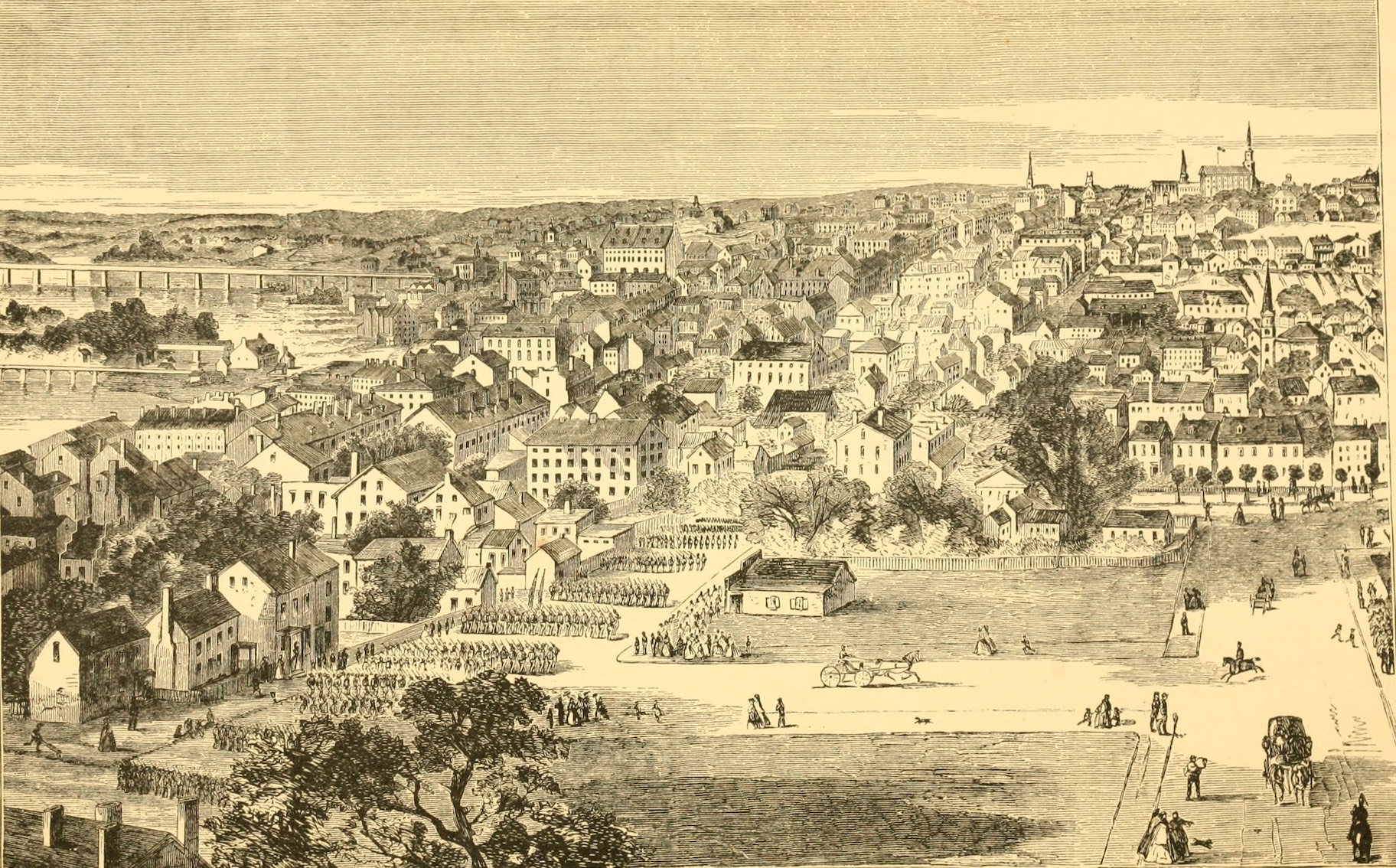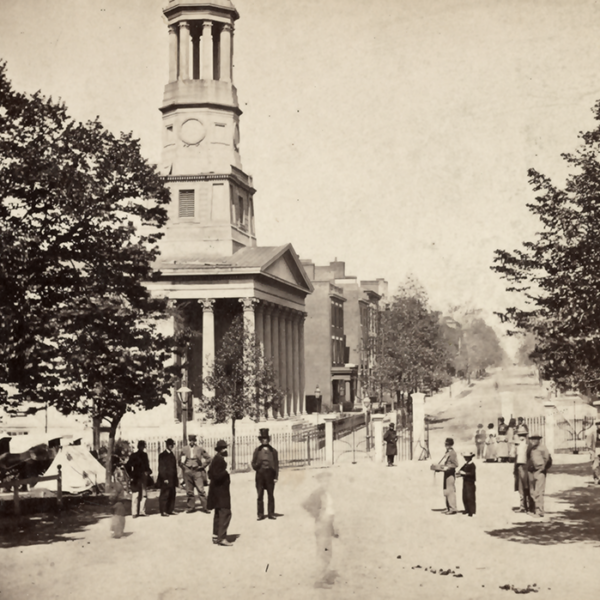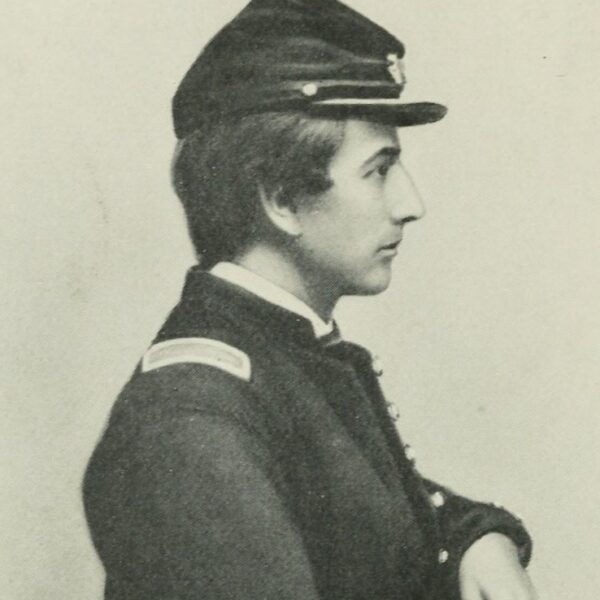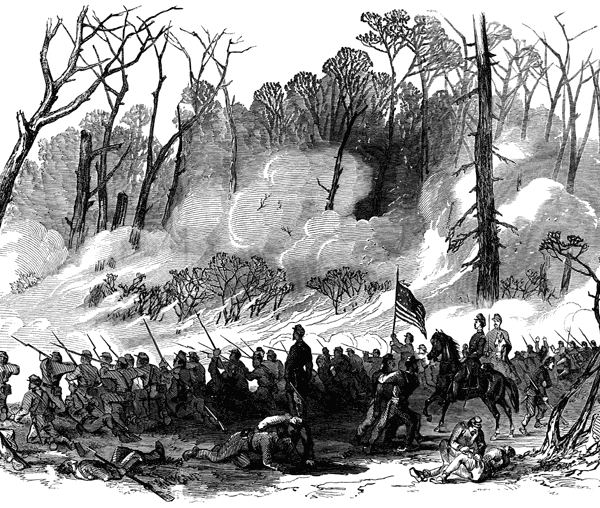 Drum-Beat of the Nation (1888)
Drum-Beat of the Nation (1888)Richmond, Virginia, from a sketch made in 1861.
In 1867, Sarah Brock’s Richmond During the War, a memoir of her experiences as a resident of the Confederate capital during the conflict, was published. The book documents Brock’s activities during the war—including sewing items for soldiers, making rifle cartridges, and helping care for the sick and wounded—and contains many observations and anecdotes on life in wartime Richmond. Below is Brock’s tale of a mysterious young woman who traveled to Richmond after the Battle of Bull Run. After the war, Brock moved to New York City, where she married and wrote several books, including Richmond During War. She died in 1911.
There is a sad story connected with this peculiar period, of woman’s devotion and man’s weakness and infidelity, in which there is blended so much romance, it might, with careful illustration and embellishment, be used as the foundation upon which to build up a tale of real life, in which truth would be stranger than fiction. We cannot certify to the truth of it, but will only relate it as it was related to us.
At Bristow Station, very near Manassas Junction, there were sojourning numerous ladies, whose husbands and friends, fathers and brothers, perhaps, were in the army near by. Just a few days before the engagement, probably about the time of the battle of Bull Run, a young girl appeared at the hotel, plainly dressed, and having with her very mean looking baggage, but with the manners and address of a lady, and there registered an assumed name. Her appearance and manners, so much at variance, awakened the suspicion and attention of her companions (to whose sex is imputed an undue share of these qualities), and carefully watching her movements, they determined to ascertain something of the motives which brought her thither at that time, when only the most intense anxiety for those near and dear induced them to remain in such close proximity to the dangers which threatened them.
For several days the mystery which was connected with her increased, and added interest to her incognito. At last, after the battle was over, applying to a lady who had a list of the casualties, she, being not supplied with one, asked that the lady would read the names of the killed and wounded in a certain battalion from ——, State of ——. Heading the list was the name of Captain ——, badly wounded and removed to Richmond. Turning deadly pale, the poor young girl reeled, and would have fallen but for the sustaining arm of the lady, which was kindly thrown around her.
When sufficiently recovered, the lady said, “What is it? tell me—is this Captain —— your husband? —your lover? —or why are you so interested in him?”
She continued then, “You are not what you seem to be. I have thought so from the moment I first saw you. These coarse clothes are surely not your own. Who are you? and where are you from? and why are you here, so young, and alone?”
With kindly interest and real sympathy these questions were asked.
“Go with me to my room, and I will tell you all. It is a long story. I cannot relate it here,” said the young girl.
 Battles and Leaders of the Civil War
Battles and Leaders of the Civil WarWounded Confederate soldiers receive aid from civilians in the streets of Richmond, Virginia.
When in the room of the unknown young girl, she began —“You are right; I am not what I seem. My home is in the far South, in the city of ——. I had been for some months betrothed to Captain ——, and he had urged our marriage. But I was young, and objected to it at the time, and after a while troubles arose between us. The engagement was broken off, and I pretended to be heartless and careless, until I found he was to leave me, and be exposed to all the dangers and misfortunes of war. He had seemed to neglect me, and thus incurred the indignation of my father and family. I had been forbidden to meet him, or in any wise to notice him. But I sought him, intending a reconciliation, and if he still loved me and wished me to marry him, to let him bear with him to the field of war the remembrance and love of his bride.
“I was too late. So hurriedly were the soldiers sent off to this State, he was compelled to leave with his regiment, not daring, I presume, to seek me after knowing the prohibition of my father to his house, and with no assurance from me that I shared not my father’s dislike for him.
“After he left I grew very miserable. The idea of his being wounded and suffering without my being with him to minister to his distresses tortured me, and that of his probable death maddened me; and I resolved to come on, see him here, and if he still wishes to carry out our former engagement, I shall marry him.
“To accomplish what I feel to be a holy duty, I have braved the everlasting displeasure of my whole family. I was compelled to keep my determination profoundly secret to prevent the thwarting of my earnest wishes. In order to be able to secure the funds necessary for my expenses I made a confidante of a friend from whom I succeeded in obtaining a promise of secrecy, and the loan of some money, which together with the sale of some valuables, afforded me means sufficient to meet any demands of the adventure. I also made a confidant of a female servant belonging to my father and obtained from her the loan of the clothing and baggage you see I have with me. My real position I studiously avoided making known, resolving, if by no other means I might obtain a meeting with the man I so dearly loved in the plain garb of a servant, and acting in that character I would reveal my presence to him.
“Now, madam, you have heard my story, and being acquainted with it, do not say you blame me; for suffering as I have done, I could not bear reproaches for what some may term my rashness. I have dared all, and braved all; the consequences I am prepared to endure—but no reproaches.”
Her listener heard her story with the sympathetic interest which ever belongs to a true woman, and promised to make such inquiries relative to her quondam lover as would be satisfactory in regard to his whereabouts, and such as, under the delicate circumstances in which the young girl was placed, she could not conveniently obtain, and preserve her incognito.
Ascertaining to a certainty that the captain in question had been sent to Richmond, she also learned that he was the invalid guest of ——, and that the wound, at first pronounced dangerous, was comparatively slight.
 American Women, Vol. 2 (1897)
American Women, Vol. 2 (1897)Sarah A. Brock as she appeared in the late 1800s.
Cheered by this information, the young girl bade adieu to her newly found friend, and hastened to Richmond to be with her lover, and soothe by her presence and gentle ministrations the sufferings he endured.
Alas! for woman’s devotion and man’s fickleness! Cupid had played a sad game with this young devotee of Mars. Unfortunately for his old love and the better principle which should have called to remembrance “the girl he left behind him”—the daughter of his kind host happened to be one of the most fascinating, fashionable, and irresistible belles of the rebel capital, and, caught in the rebound, the invincible “man of war,” who had fearlessly faced the cannon of the enemy, cowered, and fell a victim to the bewitching charms of the fair belle of Richmond.
His attentions to her from their first acquaintance indicated that his heart was not untouched, and with a coquetry unpardonable, but which is usually the accompaniment of the recognized belle, she so encouraged his overtures, as to foster hopes that she, betrothed to another, could never crown with fulfillment.
His former fiancée arrived in Richmond, and from more than one of Rumor’s thousand busy tongues, she learned of the cruel infidelity of the man for whom she had made such sacrifices. Broken-hearted and wretched, she carefully avoided making known to her faithless lover the fact of her presence so near him. She left for her distant home to meet the angry reproaches of her father—to bear alone the burden of her unhappiness.
Related topics: women




